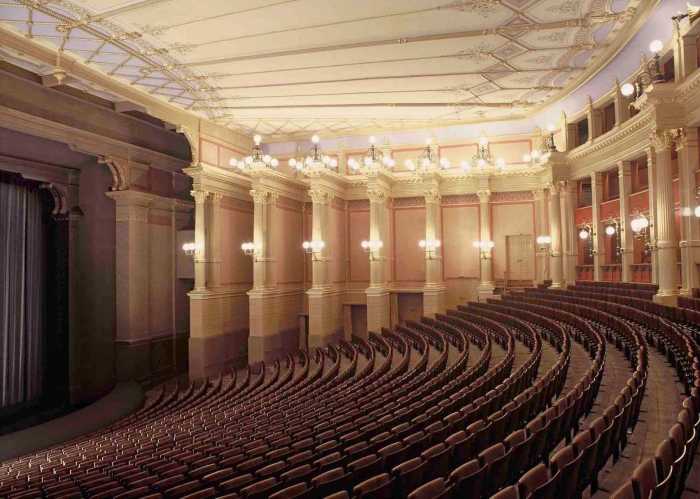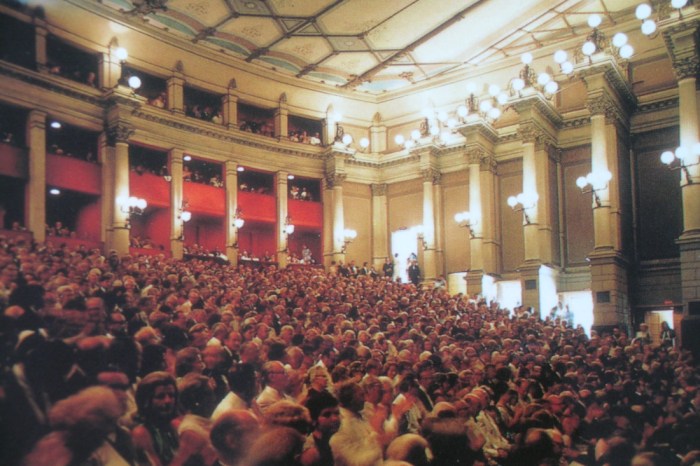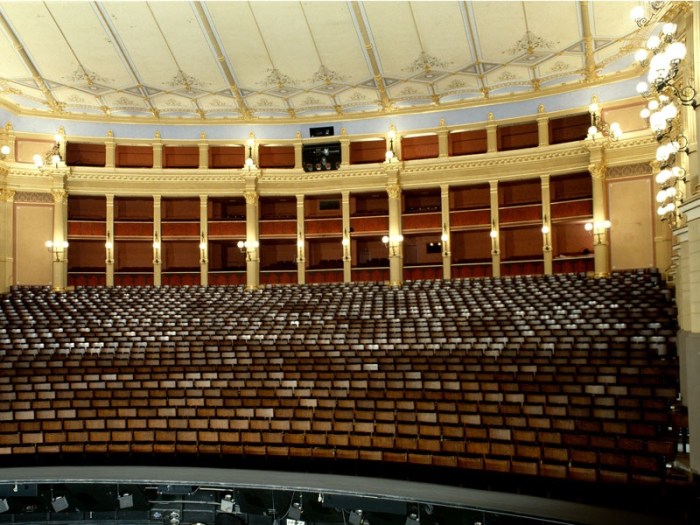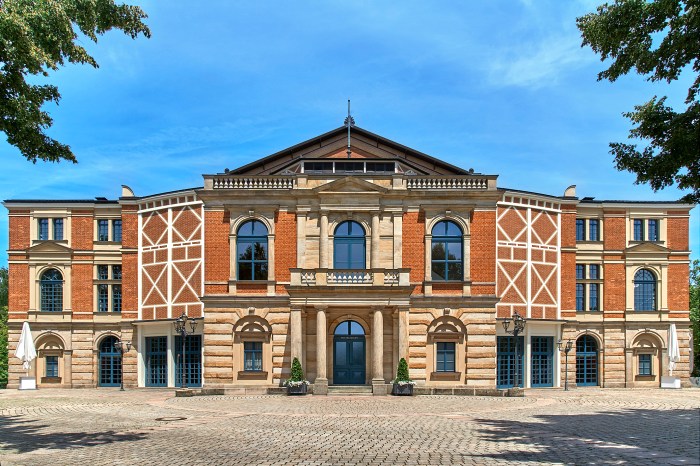Which statement does not apply to the Bayreuth Festival Theater? This enigmatic question serves as the cornerstone of our exploration into the captivating history, architectural marvels, and cultural significance of this hallowed institution. Prepare to embark on a journey that unveils the untold stories and unravels the complexities surrounding one of the world’s most renowned opera houses.
Nestled in the heart of Bavaria, the Bayreuth Festival Theater stands as a testament to the visionary genius of Richard Wagner. Its unique design, groundbreaking acoustics, and unwavering commitment to Wagnerian opera have cemented its place as a global beacon of artistic excellence.
But beyond its celebrated reputation, certain misconceptions and lesser-known facts linger. Join us as we delve into the intricacies of the Bayreuth Festival Theater, separating truth from fiction and shedding light on the statement that does not align with its illustrious legacy.
The History of the Bayreuth Festival Theater

The Bayreuth Festival Theater, renowned for its dedication to the operas of Richard Wagner, has a rich and fascinating history. The theater’s origins can be traced back to 1871 when Wagner, seeking a suitable venue for his monumental works, purchased a plot of land in Bayreuth, a small town in Bavaria.
Wagner’s vision for the theater was ambitious. He sought to create a space that would be acoustically perfect and free from the distractions of traditional opera houses. To achieve this, he employed innovative design elements, such as a sunken orchestra pit and a fan-shaped auditorium, which ensured that the sound would be evenly distributed throughout the hall.
The construction of the theater was a challenging endeavor, and it took over a decade to complete. Wagner’s meticulous attention to detail and his insistence on the highest standards of craftsmanship resulted in a theater that was both architecturally stunning and acoustically superb.
The first Bayreuth Festival was held in 1876, with Wagner conducting the premiere of his epic opera “The Ring of the Nibelung.” The festival quickly became a major event in the world of opera, and it has continued to attract audiences from around the globe for over a century.
The Role of Richard Wagner
Richard Wagner was the driving force behind the creation of the Bayreuth Festival Theater. He was not only the theater’s founder and architect but also its artistic director and principal conductor. Wagner’s vision for the theater was to create a space where his operas could be performed in their purest and most authentic form.
Wagner’s influence on the Bayreuth Festival Theater is still felt today. The theater remains dedicated to his operas, and his principles of performance and staging continue to guide the artistic direction of the festival.
The Architecture of the Bayreuth Festival Theater: Which Statement Does Not Apply To The Bayreuth Festival Theater

The Bayreuth Festival Theater is a unique and innovative architectural masterpiece. Wagner’s vision for the theater was to create a space that would be acoustically perfect and free from the distractions of traditional opera houses.
To achieve this, Wagner employed several innovative design elements, including:
- A sunken orchestra pit: This allowed the orchestra to be hidden from view, eliminating the visual distraction and improving the acoustics.
- A fan-shaped auditorium: This design ensured that the sound would be evenly distributed throughout the hall.
- A sloping floor: This allowed the audience to see the stage clearly, even from the back rows.
- A concealed lighting system: This created a more intimate and immersive atmosphere.
The Bayreuth Festival Theater is not only a beautiful and functional space but also a testament to Wagner’s genius as an architect and a visionary in the world of opera.
Acoustic Qualities, Which statement does not apply to the bayreuth festival theater
The Bayreuth Festival Theater is renowned for its exceptional acoustics. Wagner’s innovative design elements, such as the sunken orchestra pit and fan-shaped auditorium, create a space where the sound is evenly distributed and free from distortion.
The theater’s acoustics have been praised by musicians and critics alike. The conductor Arturo Toscanini once said that the Bayreuth Festival Theater was “the only theater in the world where one can hear Wagner’s music as it was meant to be heard.”
The Artistic Program of the Bayreuth Festival Theater

The artistic program of the Bayreuth Festival Theater is focused exclusively on the operas of Richard Wagner. This is in keeping with Wagner’s vision for the theater as a place where his operas could be performed in their purest and most authentic form.
The repertoire of operas performed at the Bayreuth Festival Theater includes all of Wagner’s major works, such as “The Ring of the Nibelung,” “Tristan und Isolde,” and “Parsifal.”
The Selection Process
The selection process for productions at the Bayreuth Festival Theater is rigorous. Each year, the festival’s artistic director selects a small number of operas to be performed. The selection is based on a number of factors, including the quality of the music and libretto, the suitability of the opera for the Bayreuth stage, and the availability of singers and conductors.
Once an opera has been selected, the festival’s artistic director works closely with the conductor and stage director to create a production that is faithful to Wagner’s vision.
The Cultural Significance of the Bayreuth Festival Theater

The Bayreuth Festival Theater has had a profound impact on the world of opera. It has been a major force in the development of Wagnerian opera and has influenced subsequent generations of composers and performers.
The Bayreuth Festival Theater has also played a significant role in the cultural life of Germany. It has helped to promote German culture and music around the world and has been a major tourist attraction for over a century.
International Recognition
The Bayreuth Festival Theater is recognized as one of the most important opera houses in the world. It attracts audiences from around the globe, and its productions are regularly praised by critics and music lovers alike.
The Bayreuth Festival Theater has received numerous awards and accolades over the years, including the UNESCO World Heritage designation in 2012.
The Bayreuth Festival Theater Today
The Bayreuth Festival Theater continues to be a major force in the world of opera. It remains dedicated to the operas of Richard Wagner and continues to attract audiences from around the globe.
However, the theater is also facing a number of challenges in the 21st century. These challenges include:
- Rising costs: The cost of producing opera has risen significantly in recent years, and the Bayreuth Festival Theater is no exception.
- Changing audience tastes: The audience for opera is changing, and the Bayreuth Festival Theater needs to adapt to these changing tastes.
- Competition from other opera houses: There are now many other opera houses around the world that offer high-quality productions of Wagner’s operas.
Despite these challenges, the Bayreuth Festival Theater remains a vibrant and important institution. The theater is committed to preserving its heritage while also embracing contemporary trends and innovations.
Preserving the Heritage
The Bayreuth Festival Theater is committed to preserving its heritage. The theater’s productions are faithful to Wagner’s vision, and the theater’s staff is dedicated to maintaining the highest standards of performance and production.
The theater also has a number of programs in place to educate and inspire future generations of Wagnerians.
Embracing Contemporary Trends
The Bayreuth Festival Theater is also embracing contemporary trends and innovations. The theater has recently introduced a number of new initiatives, such as:
- A new production of Wagner’s “Ring of the Nibelung” by the director Barrie Kosky.
- A new digital platform that allows audiences to watch productions of Wagner’s operas online.
- A new education program that teaches children about Wagner’s music and operas.
These initiatives are helping to ensure that the Bayreuth Festival Theater remains a relevant and vibrant institution in the 21st century.
FAQ Overview
Question 1:What is the primary focus of the Bayreuth Festival Theater’s repertoire?
Answer:The Bayreuth Festival Theater exclusively showcases the operas of Richard Wagner.
Question 2:Who played a pivotal role in the design and development of the Bayreuth Festival Theater?
Answer:Richard Wagner himself was deeply involved in the theater’s design, acoustics, and overall vision.
Question 3:What sets the Bayreuth Festival Theater apart from other opera houses?
Answer:The theater’s unique acoustics, achieved through innovative design elements, create an immersive and unparalleled listening experience.
Question 4:What is the significance of the Bayreuth Festival Theater in the world of opera?
Answer:The theater has had a profound impact on the development of Wagnerian opera and continues to influence contemporary opera productions.